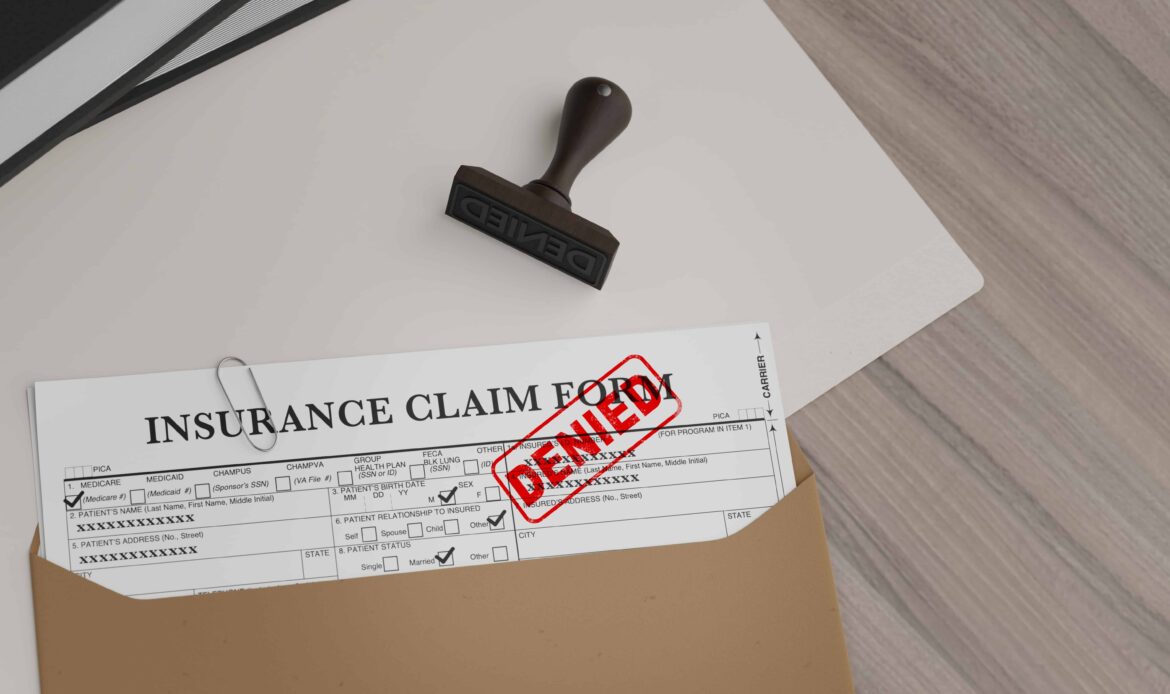After an injury caused by someone else’s actions, the path to recovery can feel like a steep climb. You’re focused on healing, managing medical appointments, and trying to get your life back on track. The last thing you need is a difficult and confusing process when seeking fair compensation from an insurance company. Unfortunately, many people find the insurance claims process filled with hurdles.
Having insight into how insurance companies deny claims or try to reduce payouts is key to protecting your rights and advocating for the compensation you deserve.
Key Takeaways about How Insurance Companies Deny Claims
- An insurance company’s primary goal is to protect its financial interests, which can create a conflict with paying the full value of a claim.
- Adjusters may request recorded statements, which can be used to find inconsistencies or admissions that weaken a person’s claim.
- Initial settlement offers are often made quickly and for a low amount, before the full extent of a person’s injuries and long-term costs are known.
- Insurers may employ a “delay, deny, defend” strategy, using procedural delays to pressure claimants into accepting smaller settlements out of frustration or financial need.
- Companies may dispute the necessity of medical treatments or argue that injuries were caused by a pre-existing condition, not the accident.
- State laws define “bad faith” practices, which occur when an insurer unreasonably denies or handles a claim without a proper basis.
The Business of Insurance: Profit vs. Payouts

It’s helpful to understand the basic business model of an insurance carrier. They are for-profit companies. They collect money in the form of premiums from their customers and invest that money to generate returns. To maintain profitability, they must carefully manage how much they pay out in claims. This fundamental financial reality means that their interests are often directly opposed to the interests of the person filing a claim. The less they pay you, the better it is for their bottom line.
This doesn’t mean every adjuster is a bad person or that the company is inherently malicious. It simply means they have a job to do: minimize financial liability for their employer. The insurance adjuster assigned to your case is a trained negotiator whose goal is to resolve your claim for the lowest possible amount. They handle hundreds of cases and are familiar with the tactics that can encourage people to accept less than what their claim may truly be worth.
Recognizing this dynamic is essential as you begin communicating with them.
Common Tactics Insurers Use to Minimize or Deny Claims
Insurance companies have developed a playbook of strategies over the years designed to reduce claim payouts. Being aware of these common tactics can help you better prepare for your interactions with an adjuster and protect the value of your claim.
The ‘Friendly’ Phone Call and Recorded Statements
Shortly after your accident, you will likely receive a call from an adjuster representing the at-fault party’s insurance company. They will probably sound very friendly, sympathetic, and helpful. They might say they just want to “get your side of the story” and ask if you would be willing to provide a recorded statement. While this may seem like a reasonable request, it is often a strategic move to gather information that can be used against you later.
Adjusters are skilled at asking questions that might seem innocent but are designed to get you to say something that could harm your case. They know that right after an accident, you may still be shaken and unsure of all the details.
Here are some examples of what they might try to do in a recorded statement:
- Downplay Your Injuries: They might ask, “How are you feeling?” If you politely say, “I’m okay” or “I’m fine,” they can later try to argue that your injuries were not serious, even if you were just trying to be polite.
- Elicit Contradictions: They will ask for very specific details about the accident. If your memory of a minor detail changes later (which is normal), they can use that inconsistency to question your credibility.
- Establish a Pre-existing Condition: They may ask broad questions about your medical history to find any prior injury they can blame for your current pain.
You are generally not required to provide a recorded statement to the other person’s insurance company. These statements rarely help your claim and can often cause significant problems.
The Quick, Lowball Settlement Offer
Another common tactic is receiving a settlement offer very quickly after the accident, sometimes within days. This might seem like a relief—a fast resolution and money in your pocket. However, this is a major red flag. A fast offer is almost always a “lowball” offer, meaning it is for a fraction of what your claim is actually worth.
Insurers make these offers because they know two things. First, you are likely under financial pressure from medical bills and lost time from work. Second, the full scope of your injuries may not be apparent yet. Some injuries take weeks or even months to fully develop, and you won’t know the total cost of your medical care, physical therapy, or potential future needs.
Accepting an early offer requires you to sign a release form. A release is a legal document where you agree to give up all future rights to seek further compensation for the incident, no matter what happens. If you later discover you need surgery or long-term care, you cannot go back and ask for more money. The case is closed forever.
Delay, Deny, Defend: The Strategy of Attrition
This three-pronged approach is one of the most frustrating strategies people encounter and is a primary example of how insurance companies deny claims. The goal is to wear you down until you are willing to accept a low settlement or abandon your claim entirely.
- Delay: The insurance company might take an unreasonably long time to respond to your calls or emails. They may repeatedly ask for the same documents you’ve already sent or claim your paperwork was lost. They might even reassign your case to a new adjuster, forcing you to start the process all over again. These delays create financial hardship and emotional stress, making a low offer seem more appealing over time.
- Deny: The company might deny your claim outright, often providing a vague or confusing reason. They may misinterpret a clause in the insurance policy or wrongly assign fault for the accident to you. They know that many people will not challenge a denial and will simply give up.
- Defend: If you do challenge the denial, the company will then shift into a defensive posture. They will use their extensive legal resources to fight your claim, hoping that the prospect of a long and costly legal battle will convince you to drop it.
Dealing with these delay tactics while trying to recover from an injury, whether you’re looking out at the Austin skyline or the Book Cliffs near Grand Junction, can be incredibly taxing. State laws exist to prevent these kinds of unfair practices.
For example, the Texas Insurance Code, outlines a list of Unfair Methods of Competition and Unfair or Deceptive Acts or Practices, which includes failing to promptly settle claims where liability is reasonably clear.
Disputing Medical Treatment and Injury Severity
Even if the insurance company accepts that their insured was at fault, they will often dispute the extent of your injuries and the cost of your medical care. They may hire a medical professional to review your records and produce a report arguing that your treatment was not necessary, not related to the accident, or that you should have recovered much sooner.
They may also use surveillance to monitor your activity. This can include anything from hiring a private investigator to simply monitoring your public social media profiles. If they find a picture of you smiling at a family barbecue or carrying groceries, they may try to use it as “proof” that your injuries are not as severe as you claim.
An insurer might challenge your claim by:
- Arguing that a gap in your medical treatment means you weren’t truly hurt.
- Claiming your pain is from an old sports injury, not the recent car crash.
- Refusing to cover certain procedures, like physical therapy or chiropractic care, by calling them excessive.
These arguments are designed to chip away at the value of your claim, reducing the amount the company has to pay for your medical expenses and your pain and suffering.
Understanding “Bad Faith” Insurance Practices

While insurance companies are allowed to protect their financial interests, they are not allowed to do so unfairly or dishonestly. Every state has laws that require insurance companies to act in “good faith.” Good faith means they must treat claimants fairly and honestly, conducting a reasonable investigation and paying valid claims promptly.
When a company violates this duty, it is known as acting in bad faith. This is a specific legal concept that goes beyond simply undervaluing a claim. It involves unreasonable and unfounded conduct. Many of the tactics discussed above can rise to the level of bad faith if they are severe enough.
Examples of bad faith practices can include:
- Refusing to pay a claim without conducting a reasonable investigation of all the facts.
- Failing to provide a prompt and reasonable explanation for the denial of a claim.
- Misrepresenting policy provisions or facts related to coverage.
- Not attempting to reach a fair settlement when liability has become reasonably clear.
Laws like the Colorado Revised Statutes § 10-3-1115 specifically prohibit insurance companies from unreasonably delaying or denying payment of a valid claim. These laws are in place to hold carriers accountable and provide a remedy for individuals who have been treated unfairly.
What to Do After an Accident to Protect Your Claim
Once you are home from the scene of an accident and have received initial medical care, the actions you take can have a significant impact on your ability to secure fair compensation. Keeping organized and being mindful of your communications are key.
- Continue All Medical Treatment. Your health is the top priority. Follow your doctor’s advice, attend all follow-up appointments, and go to your physical therapy sessions. This not only helps your recovery but also creates a clear and consistent medical record that documents the extent of your injuries.
- Keep Meticulous Records. Start a file and keep everything related to the accident in it. This includes medical bills, pharmacy receipts, letters from the insurance company, photos of your injuries, and records of the days you missed from work.
- Document Your Experience. Keep a simple daily journal. In it, write down your pain levels, any physical limitations you experience (e.g., “could not lift my child today,” “had trouble sleeping because of back pain”), and how the injury is affecting your daily life and emotional well-being.
- Be Cautious in Your Communications. Limit your conversations with the other party’s insurance adjuster. Stick to the basic facts. Do not apologize or accept any blame for the accident. Be extremely careful about what you post on social media, as adjusters will look for anything they can use to minimize your claim.
Following these steps can help you build a strong foundation for your claim and protect you from common insurance company tactics.
Insurance Companies’ Tactics and Strategies FAQs
Here are answers to some common questions people have about the insurance claim process.
What if the insurance company says the accident was my fault?
Insurance companies often try to shift blame to reduce or eliminate what they have to pay. They might say you were partially at fault even when the evidence shows their driver was negligent. In states like Texas and Colorado, which have comparative fault rules, this can reduce your compensation. It is important not to simply accept their assessment of fault.
Can an insurance company use my social media posts against me?
Yes, absolutely. Anything you post on a public social media profile is fair game for an insurance adjuster to review. They will look for photos or posts that contradict your injury claims. For instance, a picture of you on a hike could be used to argue your back injury isn’t severe. It is wise to set your profiles to private and refrain from posting about your accident or recovery.
Do I have to use the auto repair shop the insurance company recommends?
No, you typically have the right to choose your own repair shop. Insurance companies often have “preferred” shops they work with, which may use cheaper parts or methods to save the insurer money. You can get an estimate from a shop you trust to ensure your vehicle is repaired properly.
What is a statute of limitations, and how does it affect my claim?
A statute of limitations is a law that sets a strict time limit on your right to file a lawsuit. If you miss this deadline, you lose your right to seek compensation in court forever. Each state has different deadlines. For example, the statute of limitations for personal injury claims in Texas is generally two years from the date of the accident, while in Colorado, it is two years for most auto accidents and three years for others. This deadline is one reason why insurance companies may use delay tactics—they hope you will run out of time.
Protecting Your Right to Fair Compensation

Facing an insurance company after an injury can feel like an unfair fight. They have teams of adjusters and lawyers working to protect their interests. Understanding their strategies is the first step toward leveling the playing field. You have the right to demand fair treatment and just compensation for your injuries and losses.
If you are struggling to get a fair offer from an insurance company after an accident in Austin or Grand Junction, you don’t have to accept their tactics. At Slingshot Law, we stand with individuals against insurance giants. We were founded on the principle of helping good people in their time of greatest need.
Contact Slingshot Law today at (800) 488-7480 or through our online form for a free case review, and let us be the game-changing weapon in your battle.


